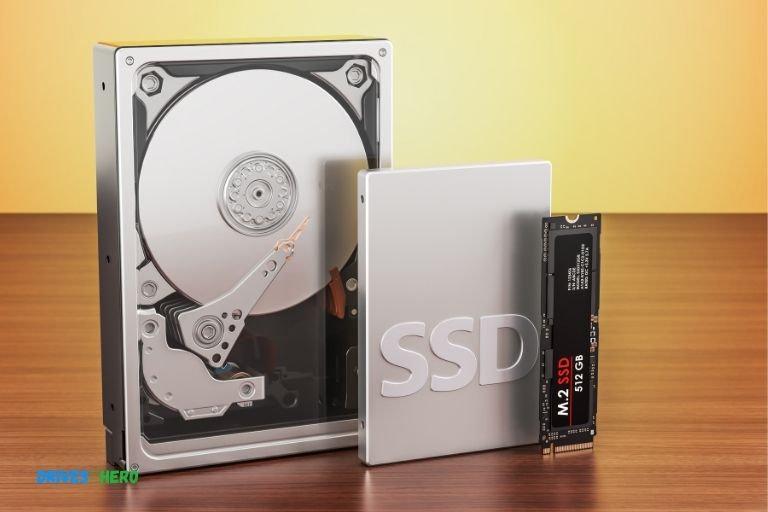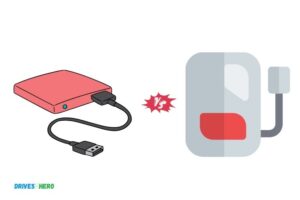External Hdd Vs Ssd for Long Term Storage
An external hard drive is better suited for long-term storage because it is more cost-effective and has higher capacities than an SSD. Hard drives are reliable, can store large amounts of data, and tend to be less expensive than SSDs.
External HDD offers more storage space than an SSD at a lower cost, making it the ideal choice for long-term data archiving.
While they don’t provide the same level of speed or performance as SSDs, HDDs are reliable and dependable for storing large amounts of data over long periods of time.
External Hdd Vs Ssd
| External HDD | SSD |
|---|---|
| Cheaper per GB | More expensive per GB |
| Slower read/write speeds | Faster read/write speeds |
| Higher storage capacity available | Lower storage capacity available |
| More susceptible to physical damage (e.g. drops) | Less susceptible to physical damage |
| Longer lifespan if not frequently used | Limited lifespan if constantly used |
| Ideal for large backups or storing infrequently accessed data | Ideal for frequently accessed data or small backups |
| Spinning parts can cause noise and vibration | No moving parts, therefore no noise or vibration |
| More common and widely available | Less common and more specialized |
Note: This table provides a general comparison between external HDD and SSD for long-term storage purposes. The choice between the two depends on individual needs and preferences.
Are Hdd Or Ssd Better for Long Term Storage?
When it comes to long-term storage, hard disk drives (HDD) are usually the best choice. HDDs offer larger capacities at a lower cost per gigabyte than solid state drives (SSD), making them ideal for storing large amounts of data over an extended period of time.
Additionally, HDD technology is far more reliable than that of SSDs and can last upwards of 10 years or more with proper care and maintenance.
That being said, HDDs are not without their drawbacks; they generate more heat than their SSD counterparts and require more electricity to operate.
As such, if you’re looking for a highly efficient drive for long-term storage needs, then an SSD may be your best option.
Are External Ssds Safe for Long Term Storage?
Yes, external SSDs can be used for long term storage with the right precautions. An external SSD is more durable than a traditional hard drive due to its lack of moving parts, making it less susceptible to physical damage or shock if dropped.
Furthermore, an external SSD will typically retain its data even in extreme temperatures and humidity levels without being corrupted.
To protect your data from loss or corruption, you should always make sure that you have regularly backed up all important files stored on your external SSD as well as using encryption software to secure the device itself.
Additionally, if not in use for extended periods of time it is best to store the device in a dry and cool place away from direct sunlight or other sources of heat.
Are Hard Drives Better for Long Term Storage?
Hard drives are better for long-term storage than other types of media, such as optical disks (CDs and DVDs). Hard drives have much greater capacity than optical media while being more reliable.
They also don’t suffer from physical degradation over time like optical disks can due to scratches or dust accumulation.
Additionally, hard drives store data magnetically, meaning that the information is not lost when power is removed—unlike with solid state storage devices like USB flash drives.
Furthermore, hard drive technology continues to evolve quickly in terms of capacity and performance, making them an ideal choice for long-term storage needs.
Ssd Vs Hdd Long Term Storage Reddit
When it comes to long-term storage, SSDs and HDDs both have their advantages. On Reddit, many users recommend using a combination of the two for maximum reliability and performance.
SSDs offer faster read/write speeds and higher durability than HDDs, making them ideal for frequently accessed files or applications that require quick access times.
However, since they’re more expensive per unit of storage space than HDD drives, they may not be cost-effective when used solely for archival purposes.
For large archives requiring low cost per gigabyte of storage space (such as photo archives), an HDD is likely the better choice in terms of value for money.
Best External Ssd for Long Term Storage
An external SSD is the perfect choice for long term storage. Not only do they offer fast read and write speeds, but they are also highly reliable and will protect your data from physical damage or degradation.
You should look for an SSD with a good warranty, as this will give you added peace of mind that your data is safe even if something goes wrong.
Reliability and durability aside, another key factor to consider when looking at external SSDs for long-term storage is capacity – make sure you get one with enough space to store all of your important files!
Best Hdd for Long Term Storage
For those looking for a reliable hard drive for long-term storage, the Western Digital My Book is an excellent option.
This external HDD offers up to 8TB of capacity and features USB 3.0 compatibility and auto-backup software that makes it easy to store and protect your data over time.
It also comes with a three year warranty, so you can trust that your files will remain in good condition even after years of use.
Ssd for Long Term Storage Reddit
SSDs are becoming increasingly popular for long-term storage due to their fast read/write speeds, reliability, and energy efficiency.
Reddit users have found that SSDs provide an excellent option for storing large amounts of data over the long term in a reliable manner. With no moving parts, there is less risk of mechanical failure than with traditional hard drives.
Additionally, SSDs require less power and produce less heat than hard disks which can be beneficial when storing large amounts of data.
Ultimately, if you’re looking for a reliable way to store your important data over the long term while also enjoying improved performance and lower energy consumption, then investing in an SSD may be the right choice!
Frequently Asked Question
What are the Main Differences between an External Hard Drive And a Solid-State Drive for Long Term Storage?
The main differences between an external hard drive and a solid-state drive for long term storage are capacity, durability, speed, power consumption and cost. External hard drives typically offer higher capacities than solid-state drives at lower costs per gigabyte of storage. Solid-state drives are more durable as they lack any moving parts which makes them less prone to damage from accidents or physical shocks.
They also have much faster read/write speeds compared to external hard drives making them suitable for applications where speed is important such as gaming or video editing. On the other hand, solid state drives consume significantly less power compared to external hard drives which can be beneficial when it comes to battery life on laptop computers.
How Much Faster is an Ssd Compared to an External Hard Drive When It Comes to Data Transfer Speeds?
An SSD is typically much faster than an external hard drive for data transfer speeds. An SSD can read and write data at speeds up to 500 MB/s, while an external hard drive usually transfers at around 100 MB/s.
Is One Type of Storage Better Than the Other for Long Term Storage?
No, there is no single type of storage that is better than the other for long-term storage. The most suitable storage option depends on a variety of factors such as cost, capacity, and the types of data being stored.
Are There Any Disadvantages of Using Either Type of Device for Long Term Storage?
Yes, there are some disadvantages of using either type of device for long term storage. Such as:
1) Data stored on magnetic media can become corrupted over time due to magnetic degradation;
2) Optical media can suffer from disc rot and data corruption due to oxidation;
3) Both types of devices have limited memory capacity;
4) Stored data may become inaccessible if the device becomes obsolete or no longer compatible with current technology;
5) Some types of storage devices require special equipment in order to access their contents.
Conclusion
When it comes to long term storage of data, both external HDDs and SSDs have their own sets of advantages and disadvantages. External HDDs are generally more affordable with larger capacity but lack in speed compared to an SSD. On the other hand, SSDs are faster with better reliability but often come at a higher cost. Ultimately, the choice between an HDD vs SSD will depend on your personal needs and budget.







